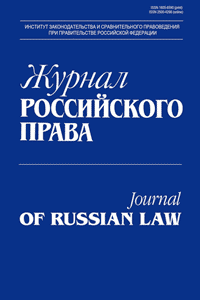Analysis of the principle of respect for human rights and fundamental freedoms, which is one of the basic principles of international law, definitely, has not only theoretical but also practical importance. Key provisions of the principle must be taken into account while implementing of any specific international obligations in the field of human rights. The purpose of this article is to identify the main elements of the principle of respect for human rights and fundamental freedoms at the present stage of development of international law, analysis of trends of development of its content. In the line of the specified objectives of the study the following new elements and tendencies of development of the maintenance of the principle are of particular relevance: first, the development trends of types of commitments included in the content of the principle, in particular, development and consolidation of such types of obligations as obligations to prevent, to respond to, to rebuilt and to punish; second, the strengthening and expansion of practice of recognition of state’s responsibility for human rights violations on the part of so-called non-state actors; third, the evolution of the content of the principles of the responsibility to protect and responsibility while protecting; fourth, the concept of state’ margin of appreciation as well as the principle of cultural relativism which are well established in the International Human Rights Law, are faced with new challenges in modern international law. Thus, the content and limits of the principle of respect for human rights and fundamental freedoms is undergoing significant changes at present and all new trends and challenges require a careful study.
Human rights, principle of respect for human rights and fundamental freedoms, positive obligations, responsibility to protect, general international law.
Центральным элементом международно-правового статуса государства является наличие комплекса основных (неотъемлемых) прав и обязанностей, которые принадлежат любому государству. Неотъемлемые обязанности государства неразрывно связаны с основными принципами современного международного права, одним из которых является принцип уважения прав человека и основных свобод.
Принцип уважения прав человека и основных свобод возлагает на государство обязательство уважать права и свободы человека. Это общее для всех государств обязательство находит конкретизацию и развитие в принимаемых на себя государствами специальных обязательствах по защите конкретных прав и свобод человека, прав отдельных категорий лиц и т. д. Принцип уважения прав человека и основных свобод, безусловно, включает требование выполнения таких специальных обязательств, однако не ограничивается им, включая также требование соблюдения норм и принципов общего характера, имеющих отношение ко всем правам и свободам человека. Именно такое общее содержание принципа уважения прав человека и основных свобод имеет ключевое значение в процессе реализации отдельных специальных обязательств в сфере прав человека — специальные обязательства должны реализовываться только с учетом общих положений принципа уважения прав человека и основных свобод. Представляется важным в связи с этим выделить основные общие элементы содержания принципа уважения прав человека и основных свобод.
Несмотря на формулировку рассматриваемого основного принципа международного права — «принцип уважения прав человека и основных свобод», — следует принять во внимание, что в настоящее время получило широкое признание наличие у государства триады обязательств в сфере прав человека: обязательство уважать, обязательство обеспечивать и обязательство защищать. Это представляется важным, поскольку большинство прав и свобод человека не могут быть реализованы без активных действий со стороны государства. Обязательство защищать, в свою очередь, может также быть разделено на несколько обязательств. Например, говоря о грубых и массовых нарушениях прав человека в случаях геноцида, военных преступлений, этнических чисток и преступлений против человечности, такой признанный в международном праве принцип, как принцип ответственности по защите (Responsibility to Protect), включает в себя следующие обязательства: обязательство предотвратить (to prevent); обязательство отреагировать (to react); обязательство восстановить (to rebuild). В науке мнения о содержании обязательства защищать разнятся, например, помимо указанных обязательств в него включается также обязательство наказать виновных лиц (to punish) и др.
1. De Wet E. The Prohibition of Torture as an International Norm of Jus Cogens and its Implications for National and Customary Law. European Journal of International Law. 2004. No. 15.
2. Evans G. From Humanitarian Intervention to the Responsibility to Protect. Wisconsin International Law Journal. 2006. No. 24.
3. Fassbender B. Securing Human Rights: Achievements and Challenges of the UN Security Council. Oxford, 2011.
4. Linderfalk U. The Effect of Jus Cogens Norms: Whoever Opened Pandora’s Box, Did You Ever Think About the Consequences?. The European Journal of International Law. 2007. Vol. 18. No. 5.
5. Perez-Leiva M. International Law and the Right to a Healthy Environment as a Jus Cogens Human Right. URL: http://EzineArticles.com/?expert=Manuel_Perez-Leiva (data obrashcheniya: 10.12.2012).
6. The Security Council and Human Rights: What is the Role of Art. 103 of the Charter?. Blog of the European Journal of International Law. URL: http://www.ejiltalk.org/thesecurity-council-and-human-rights-whatis-the-role-of-art-103-of-the-charter (data obrashcheniya: 10.03.2013)).
7. Kokorev R. S. Istoriya formirovaniya i sovremennoe ponyatie osnovnykh prav i obyazannostey gosudarstv. Rossiyskiy ezhegodnik mezhdunarodnogo prava, 2003. SPb., 2003.
8. Krasikov D. V. Pravovye pozitsii Evropeyskogo Suda po pravam cheloveka v otnoshenii zaklyucheniya pod strazhu v kachestve mery presecheniya. Zakon. 2009. Yanv.
9. Lukashuk I. I. Mezhdunarodnoe pravo. Obshchaya chast´. 3-e izd. M., 2007.
10. Rabtsevich O. I. Pravo na spravedlivoe sudebnoe razbiratel´stvo - norma jus cogens obshchego mezhdunarodnogo prava. Moskovskiy zhurnal mezhdunarodnogo prava. 2004. № 3.
11. Tiunov O. I. Vliyanie mezhdunarodnykh dogovorov i mezhdunarodno-pravovykh obychaev na natsional´noe zakonodatel´stvo. Vestnik RGGU. 2009. № 11.








